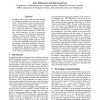Free Online Productivity Tools
i2Speak
i2Symbol
i2OCR
iTex2Img
iWeb2Print
iWeb2Shot
i2Type
iPdf2Split
iPdf2Merge
i2Bopomofo
i2Arabic
i2Style
i2Image
i2PDF
iLatex2Rtf
Sci2ools
143
click to vote
LWA
2008
2008
Weighted Voting as Approximate MAP Prediction in Pairwise Classification
Weighted voting is the commonly used strategy for combining predictions in pairwise classification. Even though it shows excellent performance in practice, it is often criticized for lacking a sound theoretical justification. In this paper, we study the problem of combining predictions within a formal framework of label ranking. In this framework, we derive a generalized voting strategy in which predictions are properly adapted according to the strength of the corresponding base classifiers, and which is optimal in the sense of yielding a MAP prediction. Then, we show that weighted voting yields a good approximation of this MAP prediction. This theoretical argument in favor of weighted voting as a quasi-optimal aggregation strategy is further corroborated by empirical evidence from experiments with real and synthetic data sets.
Related Content
| Added | 29 Oct 2010 |
| Updated | 29 Oct 2010 |
| Type | Conference |
| Year | 2008 |
| Where | LWA |
| Authors | Eyke Hüllermeier, Stijn Vanderlooy |
Comments (0)

